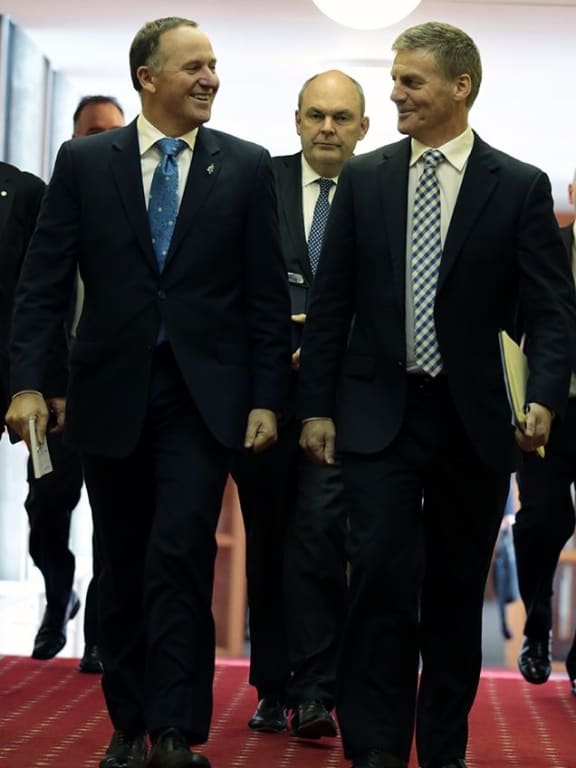While the promised government surplus is still elusive, the Finance Minister is stubbornly clinging to the hope the books will be back in the black this year.
Returning the books to surplus has not just been an economic goal - it's been the political measure by which both Bill English and Prime Minister John Key have told the public they should be measured.

From left: Prime Minister John Key, Economic Development Minister Steven Joyce and Finance Minister Bill English. Photo: RNZ / Diego Opatowski
It's been behind the drive to curb government spending - that, and the restrictions imposed by the global financial crisis, have been the catchcry as public agencies have been told to tighten their belts and continue to work within existing budgets.
The political strategy of the National Government has been to present itself as solid managers of the economy, while continually chipping away at the credentials of the left, painting opposition parties as spendthrift and reckless with taxpayers' money.
Health and education have had their budgets increased each year - but political opponents argue that's a cut in real terms as health, in particular, grapples with cost increases in real terms and higher demands.
The sinking lid of government spending has been successful insomuch as there's been little public pushback from the electorate or the public service itself. Although, it must be said that, in private conversations, many senior public servants bemoan the pressure they're under and the unrelenting drive for savings.
There's been little sympathy from the wider public - many of whom view the public service as out of touch bureaucrats who can't see past the Wellington city limits.
Many of the job losses in the public service were also made at the height of the Global Financial Crisis, which shielded the Government from any strident criticism from many voters who were facing their own financial challenges.
Now, the Government's confidently talking up a steadily growing economy, despite the Treasury's prediction the books won't return to surplus until the next financial year - a year after the Government had been aiming for.
Bill English remains doggedly optimistic that forecast is wrong, making sure to tell reporters and the several po-faced Treasury officials present at the Half Yearly Update, that the Treasury is often wrong - and often by quite big margins - and that it's all basically guesswork.
The dairy price effect
Of course, politicians are always happy to embrace Treasury projections when it suits them.
Dragging down revenue is the sudden drop in international dairy prices - about 50 percent since the start of the year - with no immediate relief in sight.
The Treasury predicts those prices will pick up at the start of 2016, but warns recovery could still take a lot longer.
Opposition parties say that will take $6 billion out of the economy, but Mr English is playing down any impact, saying the dairy industry is only about 7 or 8 percent of the economy.
However, the slide in dairy prices is far from helpful and is twinned with persistently low inflation - which, while great for the consumer, makes it harder for the Government to generate revenue through GST and income tax.
Mr English says he's puzzled by the relatively benign inflationary pressures both here and overseas, and there's still room within the New Zealand economy for inflation to increase without having a majorly detrimental impact.
He and the Prime Minister are both playing down the need to reach surplus this year, saying it matters little in the scheme of things.
However, changes to the spending track for the next three years would suggest otherwise.
Although the Government will increase new spending by roughly the same amount this parliamentary term, any thoughts of debt repayment or tax cuts are now off the table until election year.
Mr English had kept open those options for the 2015 and 2016 Budgets, but now the extra billion dollars in the kitty for either measure has been pushed back to 2017, leaving a billion-dollar new spending cap for the next two Budgets.
He acknowledges it will make it easier for the Government to reach surplus this year, as intended.
That allows him to tick off an election promise - even if the numbers have had to have been shifted around a bit to achieve it.
Follow Jane Patterson on Twitter @janepatterson
The POWER PLAY column will resume early next year

